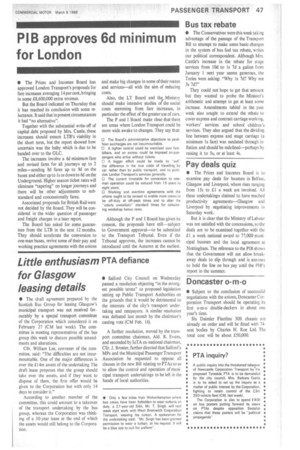PI B approves 6d minimum for London
Page 49

If you've noticed an error in this article please click here to report it so we can fix it.
• The Prices and Incomes Board has approved London Transport's proposals for fare increases averaging 14 percent, bringing in some £8,600,000 extra revenue.
But the Board indicated on Thursday that it has reached its conclusion with some reluctance. It said that in present circumstances it had "no alternative".
Together with the substantial write-off of capital debt proposed by Mrs_ Castle, these increases should ensure LTB's viability in the short term, but the report showed how uncertain was the baby which is due to be handed over to the GLC.
The increases involve a 6&l minimum fare and revised fares for all journeys up to 2 miles—sending 8d fares up to 9d on the buses and either up to Is or down to 6d on the Underground. Higher season ticket rates will eliminate "tapering" on longer journeys and there will be other adjustments to substandard and concessionally fares.
Associated proposals for British Rail were not decided by the Board. They will be considered in the wider question of passenger and freight charges in a later report.
The Board has asked for some guarantees from the LTB in the next 12 months.
They should accelerate the conversion to one-man buses, revive some of their pay and working practice agreements with the unions and make big changes in some of their routes and services—all with the aim of reducing costs.
Also, the LT Board and the,Ministry should make intensive studies of the social costs stemming from fare increases, in particular the effect of the greater use of cars.
The P and I Board make clear that there are areas where London Transport could be more wide awake to changes. They say that:
O The Board's administrative objections to peakhour surcharges are not insurmountable.
O A tighter control could be exercised over farebilkers, and an excess could be imposed on passengers who arrive without tickets.
O A bigger effort could be made to "sellthe difference in the true costs of travelling by car rather than by public transport, and to publicize London Transport's services generally.
C The current timetable for conversion to oneman operation could be reduced from 15 years to eight years.
O Working and overtime agreements with the unions ought to be revised to enable more crews to be off-duty at off-peak times and to alter the "utterly unrealistic" standard times for calculating workshop bonus rates.
Although the P and I Board has given its consent, the proposals have still—subject to Government approval—to be submitted to the Transport Tribunal. Even if the Tribunal approves, the increases cannot be introduced until the Autumn at the earliest.




































































































































